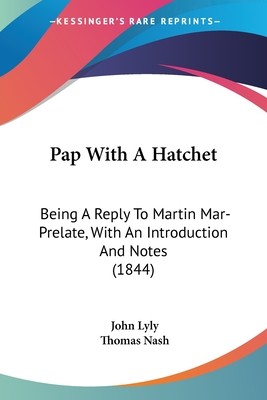
- We will send in 10–14 business days.
- Author: John Lyly
- Publisher: Kessinger Publishing
- ISBN-10: 1437025641
- ISBN-13: 9781437025644
- Format: 15.2 x 22.9 x 0.3 cm, minkšti viršeliai
- Language: English
- SAVE -10% with code: EXTRA
Reviews
Description
The first fully annotated, modern-spelling edition of Lyly's Pap with an Hatchet, this volume in the Revels Plays Companion Library series opens a window on the most neglected item in the Lylian canon. A response to a series of late sixteenth-century anti-episcopalian pamphlets issued under the pseudonym 'Martin Marprelate', Pap with an Hatchet seeks to beat Martin at his own game, employing all the devices deployed in the tracts to deride and subvert the Martinist position. Written in a racy, colloquial style, and at variance in its format with twenty-first century printing conventions, the pamphlet has remained difficult to access for the modern reader, and it is this barrier to a fuller understanding that the present edition has been designed to overcome. Re-edited from the earliest witnesses, brought into line with contemporary printing practice, richly annotated, and equipped with a substantial introduction, it enables a new insight into the witty interaction between the work and the Martinist tracts, the care underlying its composition, and the relish that Lyly brought to his task.
EXTRA 10 % discount with code: EXTRA
The promotion ends in 23d.02:47:43
The discount code is valid when purchasing from 10 €. Discounts do not stack.
- Author: John Lyly
- Publisher: Kessinger Publishing
- ISBN-10: 1437025641
- ISBN-13: 9781437025644
- Format: 15.2 x 22.9 x 0.3 cm, minkšti viršeliai
- Language: English English
The first fully annotated, modern-spelling edition of Lyly's Pap with an Hatchet, this volume in the Revels Plays Companion Library series opens a window on the most neglected item in the Lylian canon. A response to a series of late sixteenth-century anti-episcopalian pamphlets issued under the pseudonym 'Martin Marprelate', Pap with an Hatchet seeks to beat Martin at his own game, employing all the devices deployed in the tracts to deride and subvert the Martinist position. Written in a racy, colloquial style, and at variance in its format with twenty-first century printing conventions, the pamphlet has remained difficult to access for the modern reader, and it is this barrier to a fuller understanding that the present edition has been designed to overcome. Re-edited from the earliest witnesses, brought into line with contemporary printing practice, richly annotated, and equipped with a substantial introduction, it enables a new insight into the witty interaction between the work and the Martinist tracts, the care underlying its composition, and the relish that Lyly brought to his task.


Reviews